Week ahead in Parliament
- Published
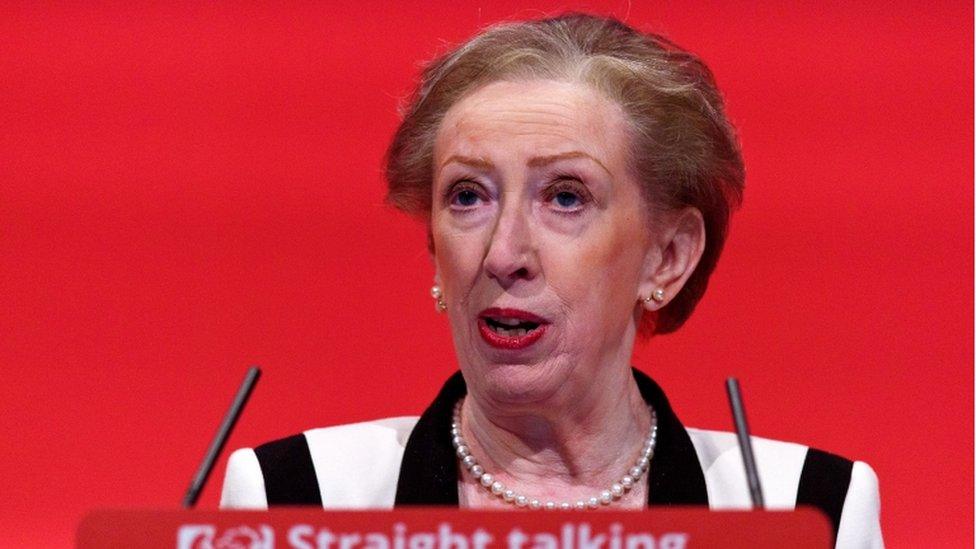
Dame Margaret Beckett is behind one of the latest move to block a no-deal Brexit
After long weeks becalmed in the parliamentary doldrums, Westminster will be moving again next week - with a couple of significant moments expected.
On Brexit there's an innovative backbench attempt to block a no-deal exit, and the long awaited publication of Gemma White QC's independent inquiry into bullying and harassment within the parliamentary community is expected early in the week.
Both could generate considerable aftershocks.
First the Brexit manoeuvre. The Labour former Foreign Secretary, Dame Margaret Beckett, and the Conservative former Attorney General, Dominic Grieve, have come up with a new line of attack.
They're proposing amendments in next week's Estimates Day debates which would block the funding of key government departments: international development, education, work and pensions and housing, unless MPs agree a Brexit outcome. In other words they aim to make it impossible for the government to bypass Parliament and impose a no-deal exit from the EU, because if ministers did, the flow of cash to government services would stop.
To succeed, this will need Labour to whip in support and deliver most, if not all, its troops, as well as the support of independents and the smaller parties; and after talking to both pro-Brexit and Remain Labour MPs, I doubt they will fancy the idea of switching off large chunks of government spending on top of a no-deal exit.
The estimates are the formal process by which MPs approve the spending of taxpayers' money, and despite recent attempts to make them a more meaningful exercise, they remain something of an empty ritual.
But if these amendments were passed (there's one for each department) there would be real impact; the amendments must then be written into the otherwise unamendable Supply and Estimates Main Appropriations Bill that goes before MPs on Wednesday.
This is one of the relatively few opportunities for opponents of a no-deal exit to seek to block it in the Commons, and the number of Conservative votes for the amendments will be an interesting barometer of the mood of Tory Remainers, and an important indicator of the scale of the parliamentary challenge which will confront the incoming prime minister.
At the moment Mr Grieve's name is joined by that of ex-minister Phillip Lee; will more rebels join them?
There are also hints the cross-party alliance behind this manoeuvre may have further tricks up its collective sleeve. Suddenly everyone seems to be on a three-line whip for Wednesday, which suggests more action to come - perhaps another Letwin-style amendment to the Business of the House Motion, to set aside another Commons day for some anti-Brexit legislation?
There is also some Brexit action in the Lords, where peers will debate a motion calling for the creation of a joint Commons Lords Committee, to report on the impact of a no-deal Brexit.
On the abuse of staff, the Gemma White report has been in the pipeline for a while - its focus is on bullying and mistreatment of staff working directly with MPs - and the parliamentary authorities are braced for another hammer blow to their institution.
It should lead to more action to protect staff, but the key thing to watch is whether generalised statements of support from the bewildering number of players in the administration of the Commons are matched by a concrete action plan.
Will they, for example, launch inquiries into historic allegations against a number of prominent figures? The point about this is staff have to have confidence in any complaints system - and maybe the only way to achieve that if for a well-known figure to publicly named and shamed.
And finally there's significant movement in the campaign to allow medical use of cannabis. Here's my rundown of the week ahead:
Monday 1 July
The Commons week begins (14:30 BST) with Work and Pensions Questions, after which the normal crop of post weekend ministerial statements and urgent questions will doubtless appear.
The day's main event is a Estimates Day debate on government spending estimates for the Department for International Development and the Department for Education, complete with Beckett-Grieve amendments (see above).
There are also a more conventional amendment from the Labour front bench, calling for a government report on the impact of the spending plans on issue like child poverty and social justice.
The day ends with an adjournment debate on children's palliative care - with the Conservative, Dr Caroline Johnson, pointing to the patchy provision of an essential service.
In Westminster Hall (16:30), Daniel Zeichner will lead a debate on e-petition 239444 which calls for homophobia to be made a specific criminal offence. It attracted 152,458 signatures.
The government responded to the petition in March recognising the "harm that homophobic online messages can cause". They say they are "working cross-government to challenge inequality and make the UK's online environment a safer place".
On the Committee Corridor, the Public Accounts Committee (16:00) has a session on penalty charge notices in healthcare. They will be examining whether the system is failing - with millions in fines uncollected and millions having to be repaid.
In the Lords (14:30) questions include Labour's Lord Haskel asking about the motion by the House of Commons declaring an environment and climate emergency.
The main debates are on two select committee reports the Chairman of the Economic Affairs Committee Lord Forsyth of Drumlean will raise their recommendations of their report on measuring inflation which found that the UK Statistics Authority is at risk of being in breach of its statutory duties on the publication of statistics, by refusing to correct an error that it openly admits exists in the Retail Prices Index (RPI).
The report calls for the authority to follow the procedure for correcting the error and resume a programme of regular methodological improvements. It also recommends a single measure of general inflation for use by the government.
Next, Lord Bassam of Brighton will lead a debate on the report from his Select Committee on Regenerating Seaside Towns and Communities: The future of seaside towns. This warned of a long-term decline in domestic tourism, fishing, shipbuilding and port activities, with seaside towns facing neglect.
It recommends that the Local Enterprise Partnerships should support seaside regeneration through Local Industrial Strategies.
Tuesday 2 July
Will this be the Chancellor Philip Hammond's final question time? He's been increasingly outspoken in recent weeks, and Treasury Questions (11:30) could provide him with the chance for another jeremiad about the promises for tax cuts and extra spending emanating from the Conservative leadership contenders.
Conservative MP Andrew Griffiths has a Ten Minute Rule Bill to entitle women aged under 40 and with a family history of breast cancer to breast screening services, and then it's back to Estimates Day debates, this time covering the Department for Work and Pensions and the Ministry of Housing. Communities and Local Government.
In Westminster Hall Labour's Chris Bryant leads a debate (9:30) on Acquired Brain Injury (ABI). He is the chair of the All-Party Group on ABI, and he wants to highlight the extent of the injury and the need to improve the support and services.
Former Defra minister George Eustice leads a debate on the religious slaughter of farm animals (11:00). There are concerns that the failure to stun animals before killing them under some methods of slaughter is cruel, and that Halal and Kosher meat should be labelled by method of slaughter.
In 2014, the All Party Group for Beef and Lamb conducted an inquiry into non-stun slaughter in accordance with religious rites and whether the right of Freedom of Religious Expression outweighs animal welfare considerations.
On the Committee Corridor, following the government's recent change in the law to commit the UK to achieving net zero carbon emissions by 2050, the Treasury Committee (9:30) takes evidence on decarbonisation and green finance. And there's a session on drugs policy at the Health and Social Care Committee (14:30) with witnesses including senior police officer and pressure groups.
In the Lords (14:30) proceedings open with the introduction of the new Bishop of Derby the Rt Rev Libby Lane. She was the first woman ever to be appointed a bishop in the Church of England, in 2015.
But because she was appointed initially as a suffragan (junior) bishop, she had to wait a while because it is only the more senior diocesans who enter the Lords. After four years as Bishop of Stockport in the Chester diocese, she was made Bishop of Derby earlier this year.
Her arrival brings the total of female bishops in the Lords up to five (of the 26). The others are, in order of entry, Gloucester, Newcastle, London and Bristol. The introduction will itself be a bit of a rarity, because it will be conducted by both Archbishops, Canterbury and York.
Then peers will approve the third reading of the Courts and Tribunals (Online Procedure) Bill before debating the Augar Review of post-18 education and funding.
Wednesday 3 July
The Commons day begins (11:30) with half an hour of Northern Ireland questions - will this be the swansong for Secretary of State Karen Bradley? And then it's Prime Minister's Question Time, which has become a rather diminished occasion, with most Conservative MPs not bothering to turn up (one count had just 99 Tories present on the green benches during this week's PMQs).
Maybe the player to watch is the SNP's Ian Blackford, who for the last two weeks has been pushing the boundaries of permitted parliamentary language, in his attacks on Tory Leadership frontrunner Boris Johnson; will he double down this week, and add to the accusations he has already made of lying and racism.
So far the Speaker has not risen to the bait and ordered him to withdraw the offending words, perhaps suspecting that the SNP leader rather hopes to be ordered out of the chamber - something his predecessor Alex Salmond never minded. But Mr Blackford may be reaching the limits of the Chair's tolerance.
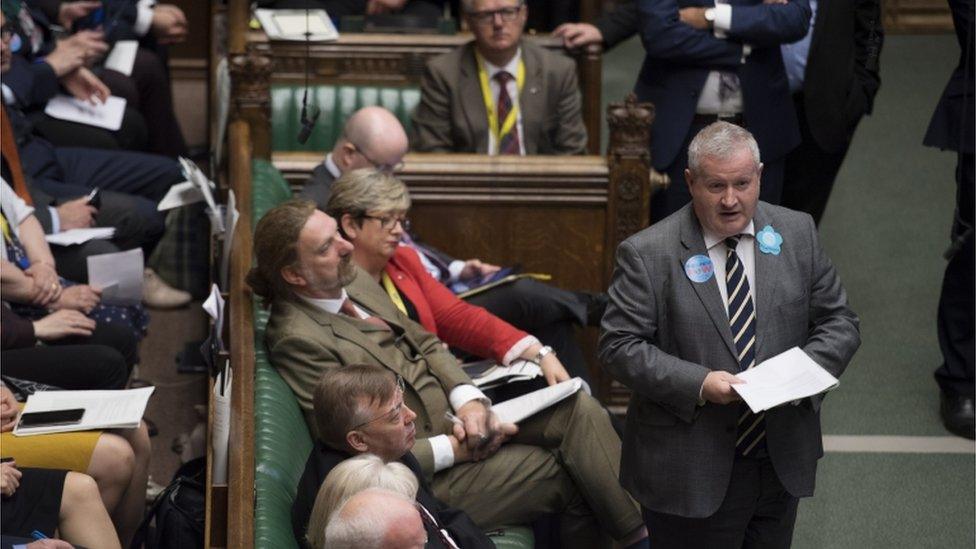
The day's Ten Minute Rule Motion from the Lib Dem ex-Scottish Secretary Alistair Carmichael calls for the government to set targets for the reduction of plastic pollution - and for the government to produce an annual report on progress.
Next there's the Supply and Appropriation (Main Estimates) (No. 3) Bill, which may or may not include amendments from the previous day's estimates debates. This is normally a brief rubber stamping exercise, with all the Commons stages taken in a single gulp.
MPs will also be asked to approve the statutory instruments on Capital Allowances (Structures and Buildings Allowances) Regulations and on the Misuse of Drugs Act.
That last one is highly significant, because it amends the definition of a range of synthetic cannabinoids currently classified as Class B drugs under the Act to remove the ban on compounds now known to have legitimate medical uses
This follows the long parliamentary campaign in around the case of Alfie Dingley whose seizures can only be controlled with cannabis-based medicines.
The Backbench Business Committee have scheduled a debate on whistleblowing with former Health Minister Norman Lamb and the Conservative Stephen Kerr calling for a review of whistleblowing regulation.
The key issue is whether the 1998 Public Interest Disclosure Act provides sufficient protection for a broader range of people. Mr Kerr (chair) and Mr Lamb (vice-chair) head up the All-Party Parliamentary Group on whistleblowing and its importance in a transparent society.
MPs will debate the effectiveness of the 1998 Public Interest Disclosure Act which was introduced to protect employees who speak out. The APPG believes the act needs to be reformed to stop unfair practice of whistleblowers losing their jobs.
Norman Lamb, the former health minister has urged the government to look into the treatment of whistleblowers in the NHS in light of the treatment of the nurses who tried to "blow the whistle" in the 1991. 456 people lost their lives as a result of the prescribing of opioids. Mr Lamb set up the Gosport inquiry when he was health minister and attempted to transform the NHS care programme in 2012.

In Westminster Hall (9:30) the Conservative Trudy Harrison will lead the debate in Westminster Hall on the red squirrel - the Wildlife Trust has predicted that red squirrels could become extinct in England in 10 years, because of competition from grey squirrels.
Then at 14:30, there will be a debate over investment in the provision of English for speakers of other languages, particularly for refugees. It's led by Labour's Preet Kaur Gill who has been lobbying the government to improve access to ESOL provision for refugee women who have childcare and caring responsibilities.
She is also a big supporter of speech, language and communication support for children. Last year she told the Commons that in 1978, as an eleven-year-old immigrant, she had the opportunity to move to England and learn English within six months.
On the Committee Corridor, the International Trade Committee hears from Secretary of State Dr Liam Fox (10:00). I daresay the implications of a no-deal Brexit might come up.
In the Lords (15:00) the main event is the Labour-led motion calling for a joint committee of Lords and Commons be appointed to report, by 30 September, on the costs and implications for the UK of exiting the EU without a withdrawal agreement on 31 October 2019.
The motion has been tabled by shadow leader of the Lords, Labour's Baroness Angela Smith with support from the Liberal Democrat leader Dick Newby, security and intelligence expert David Anderson from the Crossbenches, and the Conservative Lord Patrick Cormack.
Given the overwhelmingly pro-EU composition of the Lords, this will probably be approved, but it would also need the backing of the Commons, and it may not even be discussed there.
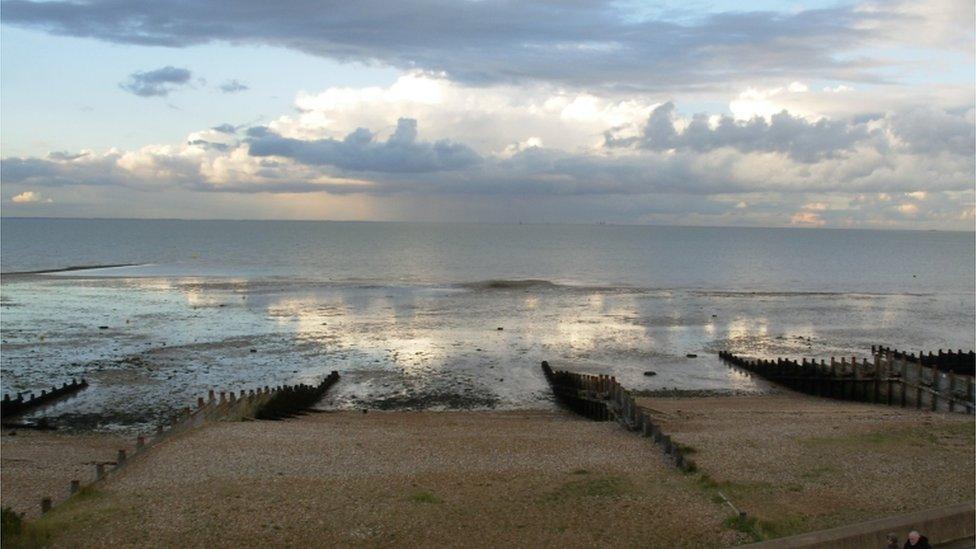
The sunken ammunition ship the SS Richard Montgomery lies in the Thames Estuary
Finally, there's a short debate on "Mitigating the risks posed by the wreck of SS Richard Montgomery" - this is an American cargo ship which sank in the Thames Estuary in 1944, carrying 1400 tons of munitions.
Labour's Lord Harris of Haringey would like the government to take responsibility for the surveillance of the wreck. It is generally agreed that the bombs are relatively safe as long as they aren't exposed to sudden shock, friction or heat. But recent surveys confirm the wreck is gradually disintegrating, and if it collapsed that could cause the sympathetic detonation of the remaining explosives, with potentially devastating consequences.
Thursday 4 July
The Commons day begins (9:30 am) with Digital, Culture, Media and Sport Questions, followed by questions to the Attorney General and the weekly Business Questions to the Leader of the House, Mel Stride.
The two main debates are on motions chosen by the Backbench Business Committee - the first is another offshoot of the plan to move Britain to a zero-carbon economy, a call to end the sale of new petrol and diesel cars and vans. Under current plans, the government's goal is for all new cars and vans to be "effectively zero-emission" by 2040.
But there are calls to bring the target forward to 2032, including from the Business Select Committee Chair, Labour's Rachel Reeves, who wants the ban to be brought forward to 2032. She is calling for an "effectively zero-emission target".
That is followed by a general debate on the law on assisted dying. Following the defeat of the last attempt at legalisation, the Assisted Dying (No.2) Bill, which would have allowed a terminally ill person to be given assistance to end their life, in September 2015. This debate will focus on the circumstances in which it should be possible for people to be assisted to die.
Its main sponsors are the Independent Conservative, Nick Boles who chairs the All-Party Parliamentary Group for Choice at the End of Life, the former Health Minister Norman Lamb and Labour's Sarah Champion.
In Westminster Hall (13:30) the Chair of the International Development Committee, Labour's Stephen Twigg, leads a debate on their report on "Forced Displacement in Africa: Anchors not walls".
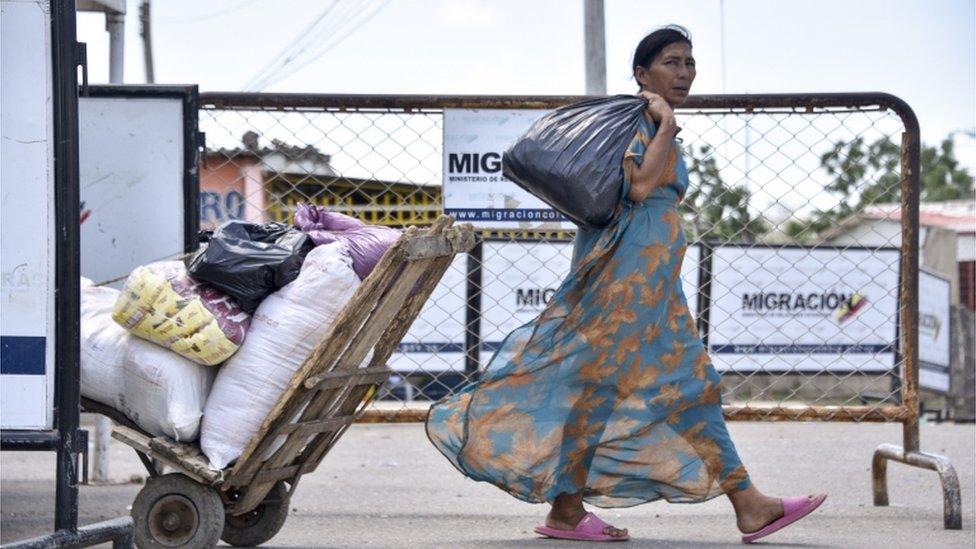
Four million of Venezuelans have left their country since 2015 due to the social, political and economic crisis
The report found that there are 68.5 million forcibly displaced people worldwide - 20 million of which live in Sub-Saharan Africa, including 13 million internally displaced people (IDPs), 5.6 million refugees and over 700,000 stateless individuals. It urges the government to 'practice what it preaches' when it comes to its policies on migration and forced displacement and to look to adopt a cross-government approach and national strategy.
That is followed by a debate over the changes to immigration rules for religious workers (15:00). Concerns over the working of so-called Tier 5 of the Religious Worker Visas will be raised by David Linden (SNP), Paul Masterton (Conservative) and Ged Killen (Labour).
The issue is a new 'cooling-off period' which prevents Tier 5 Religious and Charity Worker visa holders from returning to the UK for 12 months after their visa expires.
In the Lords (11:00) the main debates are on protecting the NHS in future trade deals entered into by the UK; the apprenticeship levy and the case for the effective delivery of workplace opportunities for young people and the role of reducing inequality and job insecurity in tackling the prevalence of mental illness - that last is led by the Crossbencher and Big Issue founder, Lord Bird.
Friday 5 July
Neither the Commons nor the Lords will be sitting - but the UK Youth Parliament's select committee on knife crime will be in action, taking evidence from four panels of witnesses, including the Home Office Minister, Victoria Atkins.
- Published5 November 2018
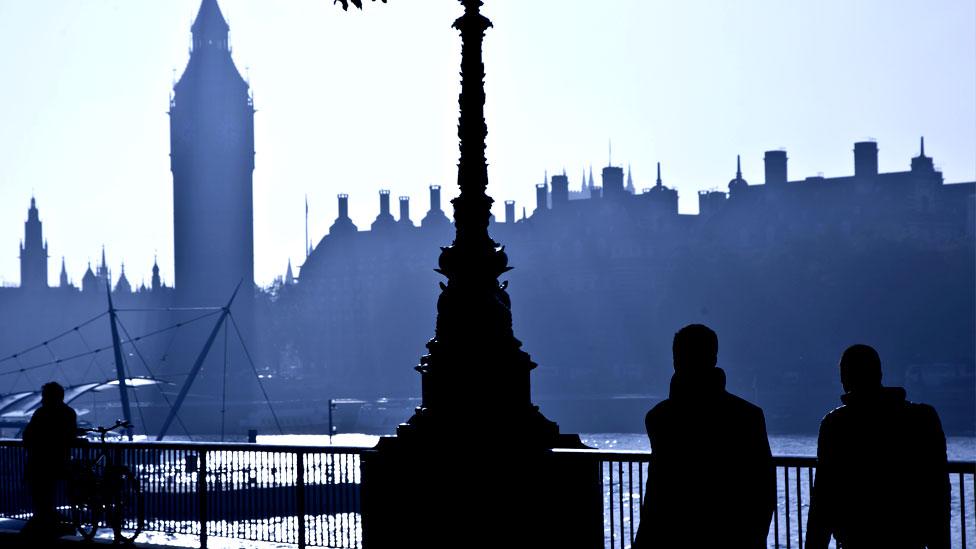
- Published6 April 2019

- Published27 October 2018

